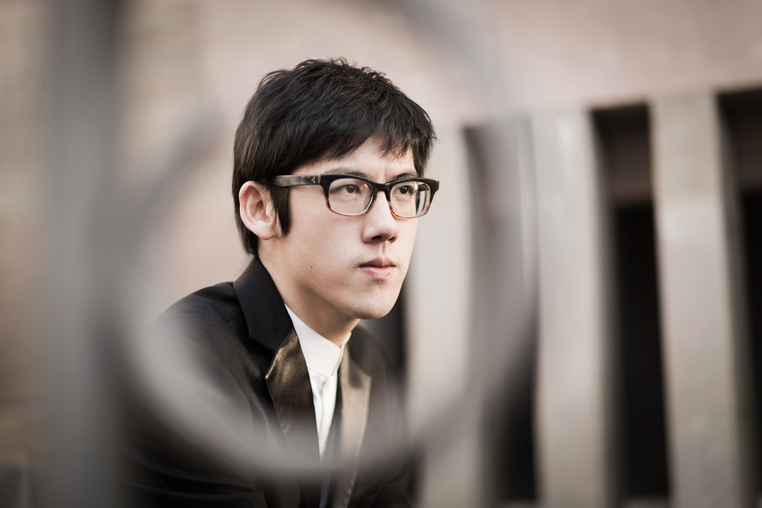
Press
[...] Chopin's Andante Spiniato and Grand Polonaise isn't heard as much these days as it used to be either. It is not Chopin at his best, as even Orrin Howard had to admit in his program note. The orchestral part is without interest. Chopin performed it only once.
But the piano writing has elegance, and Haochen Zhang, the gold medal winner of the 2009 Van Cliburn competition, played it with panache. He is a chic young pianist who displays brilliance without undo flashiness and will be worth watching. [...]
[...] Long Yu’s matter-of-fact decisiveness was actually an advantage in the constant tempo changes of Liszt’s concerto. It provided a firm frame for pianist Hoachen Zhang, who proved to be something special. He made the Allegretto dance with Mendelssohnian lightness and Lisztian diablerie, and played the melody of the Quasi Adagio with melting softeness, placing a daring pause before the repeat. That was the evening’s best moment, though there were beautiful episodes of dreamy nostalgia in Chen’s concerto, based on a much-loved Chinese melody. [...]
[...] The entrance of the 24 year-old pianist, Haochen Zhang marked a turning point in the evening. His youthfulness was striking, and the stage looking too big for him, but the piano certainly was not. Zhang’s technique in Liszt’s Piano Concerto no. 1 in E flat major was flawless. His playing was effortless, without strain or tension. I had not realised what a pleasure (or relief) it would be to witness a soloist with whom I was confident that there would be no slips. Though Liszt demands a high level of virtuosity, Zhang avoided flamboyant gestures or distracting showmanship. His immaculate playing was enough. Liszt’s concerto is mostly a virtuosic showpiece, but the nocturne-like passage that opens the slow movement gave a glimpse at the pianist’s thoughtful side. His playing was delicate and considered: he was prepared to give every note its full expression. By the work’s finale, Zhang’s vibrant confidence had rubbed off onto the orchestra, as they finally began to revel in their own sound. [...]
Of the evening’s two soloists, one was Chinese, the other British. Haochen Zhang brought lithe energy, crystal clarity and (once past the crunching wrong notes of the opening flourish) impressive precision to Liszt’s Piano Concerto No. 1. British trumpeter Alison Balsom was then the soloist in a new Chinese work, Qigang Chen’s Joie éternelle, a BBC co-commission receiving its first UK performance – an evocative mood piece, as much French in its subtle impressionism as Chinese, and quite a test for Balsom’s nimble fingers.
[...] The two very different concertos at the programme's centre were more satisfactory. Haochen Zhang was the soloist in Liszt's First Piano Concerto, flamboyantly moody throughout and injecting some much-needed passion into proceedings. After the interval came the UK premiere of Joie Eternelle, a set of variations on a traditional Chinese melody for trumpet and orchestra, written for Alison Balsom by Qigang Chen, Shanghai-born, Paris-based and a pupil of Messiaen.
[...] In Liszt’s First Piano Concerto Haochen Zhang, Gold Medal Winner at the 2009 Van Cliburn Piano Competition, showed himself to be another very fine artist from the People’s Republic. He brought a very individual approach to the work, often unexpected in choice of phrase and changes of pulse, but intriguingly re-creative and usually convincing. Also unexpected was a fairly substantial break of several seconds between the opening Allegro maestoso and the work’s second section (the work plays continuously). But the unusual ploy seemed to make sense on this occasion. As an encore Zhang played Liszt’s La campanella, again in an attractively quirky fashion. [...]
[...] To end the evening, another 24-year-old, Haochen Zhang, joined the orchestra for the Grieg Piano Concerto. Zhang is that rarity, a young competition winner of real musicality rather than just flash. His delivery of the first movement’s main theme at once demonstrated his ability to combine gentleness with firmness, flexibility with discipline. He covered a dynamic range from the merest whisper to a positively thunderous fortissimo, without losing presence at one end or degenerating into facile banging at the other — the tone was always rich and centered, never metallic.
Conductor Tai permitted some less than precise synchronization in an otherwise compelling account of the orchestral part. Grieg’s concerto may be an over-familiar warhorse. Liszt loved it, whereas Debussy said he couldn’t understand why it was continually broken up by “marshal trumpet blasts, usually announcing nothing more than a languishing little cantabile.” With a soloist of this caliber, though, the piece can take on a welcome touch of freshness. Zhang may well be a star in the making.

